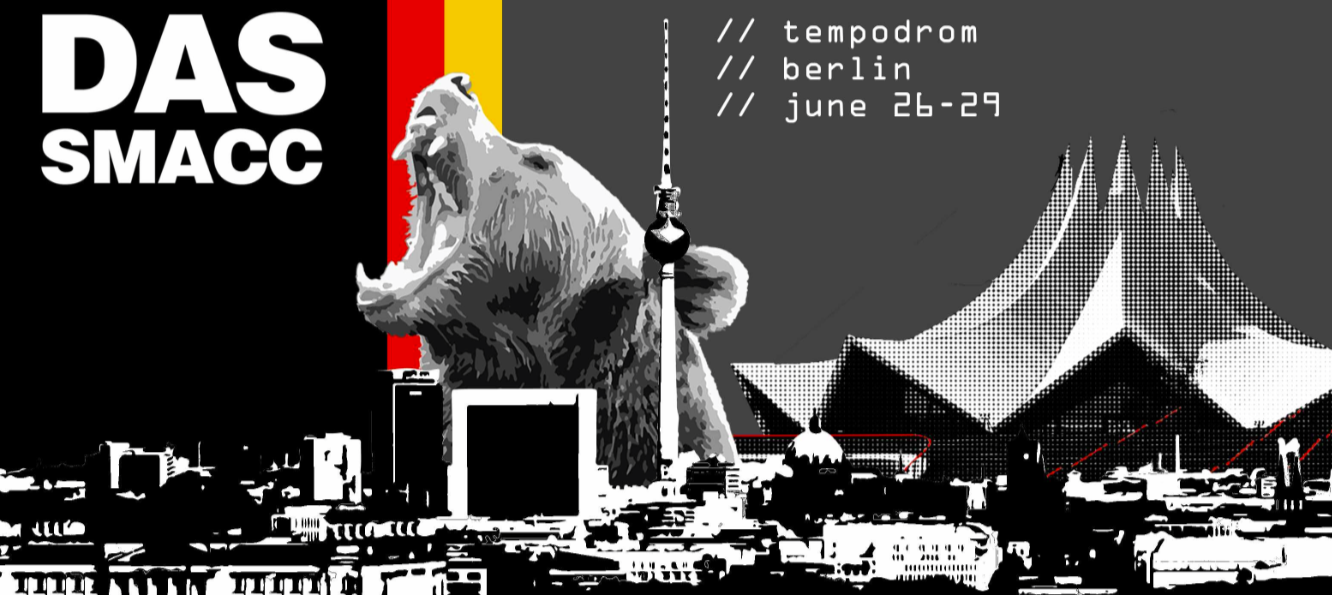A few weeks after the madness that was #smaccDUB and it’s good to see various blogs summarising what the event meant for them (search for #smaccDUB to read the many reports of smacc in Dublin 2016).
Rest assured, the smaccTALKS will soon be coming out via smacc.net.au, intensivecarenetwork.com and the smacc-affiliated websites, of which KIDocs.org is proud to be one.
Next year smacc continues in the Northern Hemisphere – the Teutonic DASsmacc will be held over four days in Berlin from 26-29 June 2017.

This will be the fifth smacc event…and as other conferences slowly begin to adopt the smacc-format of engaging TEDx style talks, powerful presentations and engaging speakers, it’s anticipated that DASsmacc will again break the mould.
In part I reckon the venue will force some changes; the Tempodrom is really designed as a concert venue – one stage, surrounded by seating. Which means, I think, that there will be scant place for concurrent sessions – rather the WHOLE of the smacc content is potentially going to be played out in the one arena.

A challenge? Perhaps – but in many ways the single stage may make it easier. This opens up opportunities – wouldn’t it be fantastic if, instead of having several thousand critical care afficianados come together to hear a select few speak, the conference concept was ‘flipped’ such that every attendee was also a participant?
Attendees as Particpants?
How? Well of course there will be the usual finely-crafted talks across a range of topics (more on that later)…but there’s opportunity to mix it up. Have panel discussions, have real-time simulation, have competitions and challenges. The 2016 smaccDUB showcased wrist bracelets that attendees wore as part of the opening ceremony light show and gala dinner; how easy would it be to use the same technology to select audience members – perhaps select attendees to participate as the ‘on call team’ for a sim session? Or to use colour bracelets to indicate audience polling on a controversial subject?
Creating immersive audience participation, such that all attendees contribute to the smacc content is one thing….how about the content itself?
One of my beefs with much FOAMed content is that we often emphasise critical care from a tertiary perspective, more often than not as practiced in a developed critical care system. As such, the talks may be focussed on the 1% of the 1% – on prehospital REBOA, on ECMO etc.
Let’s step back and consider critical illness as a spectrum
As a rural primary care practitioner, I am privileged to be involved in all aspects of my patient’s journey. On occasions I am called to the roadside to assist the (mostly volunteer) ambulance crews for a vehicle trauma. It’s easy to talk about the immediate care – the technical challenges of extrication facilitated by placement of an IO and an aliquot of ketamine…the roadside RSI followed by bilateral finger thoracostomies…the use of prehospital blood products….the use of POCUS in flight to confirm free fluid in abdomen and fast-track straight to OT in the haemodynamically unstable.
Many weeks after that same patient returns to their home, their pelvic and spinal fractures healed, their lung empyema drained….then the HARD work in primary care starts…managing their chonic pain, sorting out the skin grafts from their decubitus ulcers picked up in ICU, dealing with their depression, their weight gain and loss of function that impact in lost QALYs etc. This is the grind of primary care..dealing with downstream consequences and is important to understand how this enmeshes with the work in resus.
As well as the role of clinicians in prevention and rehablitation, we also don’t talk about prevention – the mundane stuff of seat belts, of crash helmets, of driver education, of designing out human error by use of crash barriers, airbags and so on. But this is important. And that’s just for trauma. Where is our preventative care for other aspects of critical illness?
So for DASsmacc I think there are two angles to consider.
First, that is we are serious about making a difference in critical illness, then we need to consider other aspects of the critical care journey. I recall Karim Brohi speaking in Melbourne at the ATS Trauma 2007 conference, reminding us that it is “more important to be the fence at the top of the cliff than the ambulance at the bottom”
We need to talk about other aspects – preventative care…organ donation…the longterm morbidity, whether it be physical or psychological. Primary care…
It would be awesome to explore these aspects for a variety of patients in a system….whether it be the trauma patient (prevention, rehabilitation), the unsalvageable (advanced care directives in primary care, the nitty-gritty of organ donation). I would love to hear more from those experts in prevention, in rehabilitation, in primary care….in how we can make a difference to critical illness. I’d also like to hear more from the administrators – the people who manage the systems within which we work…how do they see incremental improvement in this arena?
Critical Care – Everywhere!
Second up, we need to acknowledge that critical illness is a global phenomenon for which many do not have the same resources as the typical audience at smacc. As such, we can make an awful lot of difference by both understanding the dynamics of global critical illness and also contributing to effective knowledge translation. prehospital REBOA is for a very few…access to contextually-relevant knowledge and skills is likely to give more bag for buck.
A conversation with BAD-EM’s Ross Hofmeyer after the airway workshop brought this home; I had no idea that access to bougies in South Africa is problematic. Ross told me that bougies tend to be re-used for up to two years in Cape Town. I shudder to think how many bougies I’ve used, whether in theatre or ED..or on airway courses. I;d love to start a scheme whereby used bougies can be collected and sent on to Ross and colleagues at BAD-EM….
…and if Cape Town needs this sort of stuff, then how about clinicians in South America, sub-Saharan Africa, Pakistan etc? I have no idea….but the potential for the critical care community to make a difference to global care is huge.
On that note, smacc was held during Ramadan. Does that impact on the ability of some clinicians to attend? Perhaps, I honestly don’t know. But where are the talks on the burden of trauma & critical care from the Middle East, South Asia etc?
Whatever #DASsmacc holds, I do hope that it has an appreciation of the global burden of critical illness and helps advocate for effective knowledge translation back from the conference to those places that are currently not part of the smacc community.
Expert Panels – TEDx talks – BLAST Updates – Cage Fights – Rants – Sim Team Challenges
So, what could DASsmacc look like?
- 100% conference audience involvement, attendees as participants
- longitudinal progress of a variety of patients through a system of critical care (from prevention, resus and critical care through to rehabilitation, with inout from primary care, psychology, health admin and systems engineers)
- the usual format of engaging speakers, panel discussions intermixed with short ‘blast’ talks, rants (as at #smaccFORCE) and audience participation through polls, challenges, sim etc
- appreciation of the context of critical illness, with discussion of applicability on a global scale, ensuring effective knowledge translation..not just of the ‘sexy’ minutiae, but through ensuring broad-brush applicability to humanity.
Because if we are serious about making a difference in critical care, we need to think outside the confines of Western tertiary care…let’s make #DASsmacc be all about ‘critical care, everywhere’
Great ideas! I’m already super excited about 2017. Maybe the size of the venue can be a bit of a challenge but you seem to have things under control ?
Keep up the great work! Thanks for your passion!
I love the ideas Tim! With all the momentum that SMACC has gained, let’s hope that the future ones are even better and focus on topics that could create an even bigger impact. Exciting things to come!
Great comments and thoughts Tim. You have an uncanny knack of predicting the future and I hope you’re right again.
SMACC has changed the face of medical conferences.
S
Great comments and thoughts Tim. You have an uncanny knack of predicting the future and I hope you’re right again.
SMACC has changed the face of medical conferences.
S
Although uncomfortable 2 think bout prevention & post icu care, and most importantly enhanced awareness of our indeed luxurious setting (aware of this every day), I agree. How about challenging ad hoc attendee-sim-teams w in situ resource limited settings, power breakdowns, unavailability of diagnostics, staffing… od course we hear from colleagues working in such environments regularly, but another live xperience will impress imo